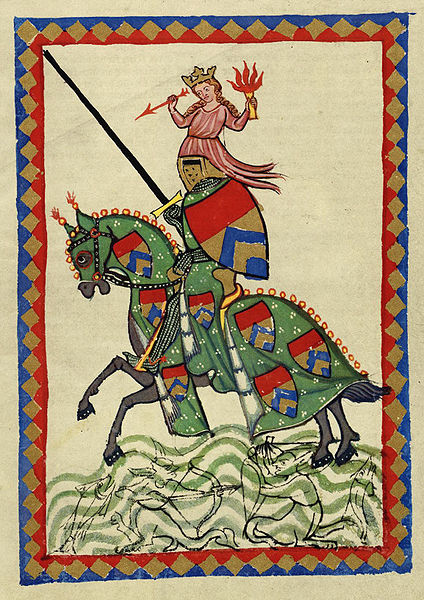Transvestite Knights in the Thirteenth Century March 7, 2011
Author: Beach Combing | in : Medieval , trackbackUlrich von Liechtenstein (obit 1278) was a standard thirteenth-century knight. He had castles (three of them). He fought – above all, in Eastern Germany. And he also dressed up as a woman and rode from Maestre (Venice) up to Vienna.
Yes, yes, Beachcombing stopped too when he first read this many years ago. But now he no longer even notices. This is what comes of spending half your life in the Middle Ages…
The root of Ulrich’s unlikely transvestism was courtly love. In his poetical ‘autobiography’ – a word Beachcombing will return to – Ulrich describes how he decided to undertake his quest as an act of homage to one lady, but also, by extension to all women. Indeed, his autobiographical work – ich comes up frequently – is entitled Frauendienst (Lady Service).
As Ulrich rode through the hinterland of hellish medieval Europe – spending half your life in the Middle Ages also makes Beachcombing all too honest about what kind of world theirs was – he challenged the knights he met to jousts and gave gifts to ladies.
By the end of his little jaunt Queen Venus (i.e. Ulrich in drag) had broken 307 spears, donated 271 rings and unhorsed four knights. Included among his honoured opponents was a knight dressed as a monk that Beachcombing will let pass without any comments. But also interestingly another knight dressed as a woman. How Beachcombing would have liked to have seen that joust.
Ulrich also suffers for his lady: courtly love often reminds Beachcombing of the black charcoally bits of a casserole that has been badly burnt in a pan.
So Ulrich lives with lepers, he loses a finger (that he naturally sends HER) and his joints crack as SHE rejects him yet again.
The million-dollar question is though whether this journey through the hinterlands of Europe really happened.
In the nineteenth century most scholars believed that it did happen: in fact, many took Ulrich’s voyage of discovery for granted.
In the twentieth century most scholars hurried embarassedly over the incident and assumed that it was a literary conceit. Think Dante and the Divine Comedy, unless, of course,…
Then, today, there are some slight, slight signs that the nineteenth-century view is returning: though now it is not world-weariness with the Middle Ages, but rather an interest in transvestisism, a magic word that will open doors and have grants showered on you across the west’s humanity’s departments: ‘Transvestisism in the lives of the Armenian saints? Come on in!’
Ulrich may be a hero for our times… But what would his lady have said?
Beachcombing wants the autobiographical poem to be, well, autobiographical. But, of course, that is not quite the same as believing that it really was a statement of events as they happened. Still he can hope… and in Beachcombing’s experience the opinions of the nineteenth century are often closer to the truth than those of the twentieth.
Other views: drbeachcombing AT yahoo DOT com
PS For a cross-dressing Irish abbot…



